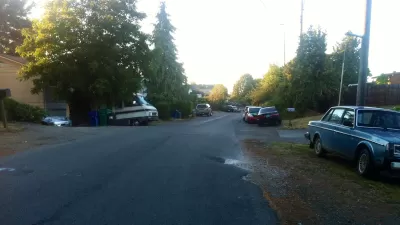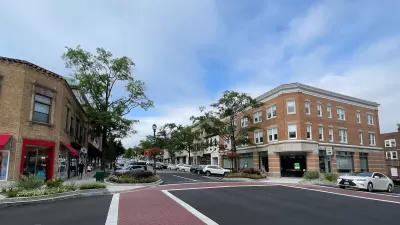You're probably familiar with the sight of a long, quiet residential street unadorned by sidewalks, pushing pedestrians, pets, and kids on bikes onto the street. Is there ever a good reason for such a typology?

Malcolm Kenton addresses a question posed by Greater Greater Washington reader Phil L.: "Do sidewalks measurably improve pedestrian safety even in low traffic density areas, like residential neighborhoods? What would be a compelling reason to have a residential street without a sidewalk?"
The questions comes as Washington D.C. and other cities are retrofitting some residential neighborhoods with sidewalks.
The post poses the question to a group of experts—contributors to Greater Greater Washington—for their opinion on the matter. The article provides a lot of good data, well-considered opinion, and historic background on why some residential neighborhoods lack sidewalks.
FULL STORY: Ask GGW: Is there any reason not to have a sidewalk?

Planetizen Federal Action Tracker
A weekly monitor of how Trump’s orders and actions are impacting planners and planning in America.

Chicago’s Ghost Rails
Just beneath the surface of the modern city lie the remnants of its expansive early 20th-century streetcar system.

San Antonio and Austin are Fusing Into one Massive Megaregion
The region spanning the two central Texas cities is growing fast, posing challenges for local infrastructure and water supplies.

Since Zion's Shuttles Went Electric “The Smog is Gone”
Visitors to Zion National Park can enjoy the canyon via the nation’s first fully electric park shuttle system.

Trump Distributing DOT Safety Funds at 1/10 Rate of Biden
Funds for Safe Streets and other transportation safety and equity programs are being held up by administrative reviews and conflicts with the Trump administration’s priorities.

German Cities Subsidize Taxis for Women Amid Wave of Violence
Free or low-cost taxi rides can help women navigate cities more safely, but critics say the programs don't address the root causes of violence against women.
Urban Design for Planners 1: Software Tools
This six-course series explores essential urban design concepts using open source software and equips planners with the tools they need to participate fully in the urban design process.
Planning for Universal Design
Learn the tools for implementing Universal Design in planning regulations.
planning NEXT
Appalachian Highlands Housing Partners
Mpact (founded as Rail~Volution)
City of Camden Redevelopment Agency
City of Astoria
City of Portland
City of Laramie





























